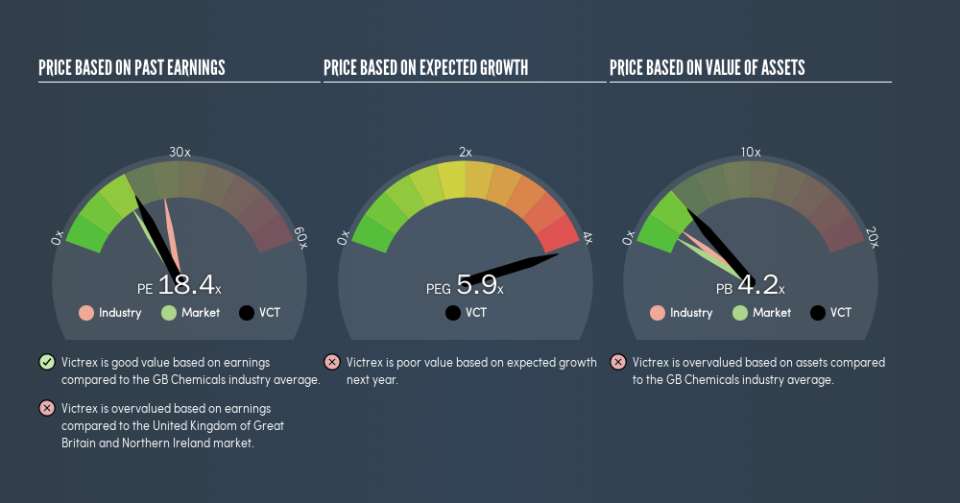Do You Like Victrex plc (LON:VCT) At This P/E Ratio?

The goal of this article is to teach you how to use price to earnings ratios (P/E ratios). We’ll show how you can use Victrex plc’s (LON:VCT) P/E ratio to inform your assessment of the investment opportunity. Victrex has a price to earnings ratio of 18.43, based on the last twelve months. That is equivalent to an earnings yield of about 5.4%.
View our latest analysis for Victrex
How Do I Calculate A Price To Earnings Ratio?
The formula for P/E is:
Price to Earnings Ratio = Share Price ÷ Earnings per Share (EPS)
Or for Victrex:
P/E of 18.43 = £23.74 ÷ £1.29 (Based on the year to September 2018.)
Is A High Price-to-Earnings Ratio Good?
A higher P/E ratio means that investors are paying a higher price for each £1 of company earnings. That isn’t necessarily good or bad, but a high P/E implies relatively high expectations of what a company can achieve in the future.
How Growth Rates Impact P/E Ratios
Probably the most important factor in determining what P/E a company trades on is the earnings growth. When earnings grow, the ‘E’ increases, over time. That means even if the current P/E is high, it will reduce over time if the share price stays flat. Then, a lower P/E should attract more buyers, pushing the share price up.
It’s great to see that Victrex grew EPS by 11% in the last year. And earnings per share have improved by 7.9% annually, over the last five years. So one might expect an above average P/E ratio.
How Does Victrex’s P/E Ratio Compare To Its Peers?
The P/E ratio indicates whether the market has higher or lower expectations of a company. We can see in the image below that the average P/E (25.3) for companies in the chemicals industry is higher than Victrex’s P/E.
This suggests that market participants think Victrex will underperform other companies in its industry. Since the market seems unimpressed with Victrex, it’s quite possible it could surprise on the upside. If you consider the stock interesting, further research is recommended. For example, I often monitor director buying and selling.
Remember: P/E Ratios Don’t Consider The Balance Sheet
Don’t forget that the P/E ratio considers market capitalization. In other words, it does not consider any debt or cash that the company may have on the balance sheet. In theory, a company can lower its future P/E ratio by using cash or debt to invest in growth.
Such expenditure might be good or bad, in the long term, but the point here is that the balance sheet is not reflected by this ratio.
How Does Victrex’s Debt Impact Its P/E Ratio?
Since Victrex holds net cash of UK£144m, it can spend on growth, justifying a higher P/E ratio than otherwise.
The Verdict On Victrex’s P/E Ratio
Victrex has a P/E of 18.4. That’s higher than the average in the GB market, which is 16. Its net cash position supports a higher P/E ratio, as does its solid recent earnings growth. So it is not surprising the market is probably extrapolating recent growth well into the future, reflected in the relatively high P/E ratio.
Investors should be looking to buy stocks that the market is wrong about. People often underestimate remarkable growth — so investors can make money when fast growth is not fully appreciated. So this free visualization of the analyst consensus on future earnings could help you make the right decision about whether to buy, sell, or hold.
Of course, you might find a fantastic investment by looking at a few good candidates. So take a peek at this free list of companies with modest (or no) debt, trading on a P/E below 20.
We aim to bring you long-term focused research analysis driven by fundamental data. Note that our analysis may not factor in the latest price-sensitive company announcements or qualitative material.
If you spot an error that warrants correction, please contact the editor at editorial-team@simplywallst.com. This article by Simply Wall St is general in nature. It does not constitute a recommendation to buy or sell any stock, and does not take account of your objectives, or your financial situation. Simply Wall St has no position in the stocks mentioned. Thank you for reading.


